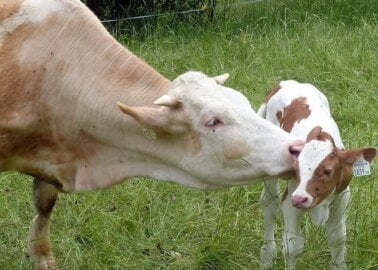The Damaging Environmental Impact of Wool
Wool production is a nightmare for the living planet. According to the recent “Pulse of the Fashion Industry” report, wool is one of the five most environmentally damaging materials.
Sheep farming, just like cattle farming, generates huge quantities of the greenhouse-gas emissions that cause climate change.
It’s time we all considered the negative environmental impact of wool, as well as the horrendous cruelty that sheep face in the industry, and made the switch to sustainable vegan fashion.
Sheep Farming Has a Huge Carbon Footprint
Sheep eat a lot – and as they digest their food, gases build up inside their intestines that must be expelled. So they burp and fart a lot, releasing enormous amounts of methane gas into the atmosphere. The UK’s vast sheep population (over 30 million) has been identified as a major contributor to climate change. One sheep can produce about 30 litres of methane each day. And in New Zealand, gases passed by animals – mostly sheep – make up more than 90 per cent of the nation’s total methane emissions.
Manure from sheep and other animals exploited on farms has significantly contributed to the increase in atmospheric greenhouse gases over the last 250 years. And excrement from sheep is also polluting our land, air, and water, causing eutrophication, a serious ecological problem that occurs when run-off waste causes excessive growth of plant life in water systems. This suffocates animals by depleting oxygen levels in the water and is the leading cause of “dead zones”.

Wool Production Leads to Deforestation
Wool production gobbles up precious resources. Environmentalists are increasingly highlighting the negative impact of sheep farming on the landscape.
Land has been cleared and trees have been cut down to make room for grazing sheep, leading to increased soil salinity, erosion, and decreased biodiversity.
More land for sheep means less land for other animals. In England and Wales, farming has stripped almost the entire upland area of wildlife such as eagles and mountain hares. If we stopped exploiting sheep, this land could be returned to nature, allowing the re-establishment of forests, wetlands, and other vital natural habitats that provide wild animals with homes.
 Jo-Anne McArthur / We Animals
Jo-Anne McArthur / We Animals
Production Methods Release Toxic Chemicals
Pesticides and insecticides are often used on sheep to keep them free of parasites. And once sheep have been shorn, their wool is scoured and washed using chemicals, which can also contaminate nearby water sources.
“Sheep dip” pesticides were named the major cause of a decline in numbers of brown trout in the River Teifi in Wales, while the use of dangerous organophosphate chemicals in the UK in the 1990s left hundreds of sheep farmers with debilitating health conditions.

Wool Production Is Cruel
On top of the wool trade’s horrendous environmental impact, sheep suffer terribly in the industry. PETA has released video exposés recorded at nearly 100 facilities on four continents revealing that sheep are mutilated, abused, and skinned alive – even for “responsibly sourced” wool on disingenuously named “sustainable” farms.
 A World of Eco-Friendly Choices
A World of Eco-Friendly Choices
Just as we’ve seen with the shift away from fur, angora wool, and mohair, consumers are increasingly looking to purchase clothes that are proudly consistent with their humane values and their concern for animals and nature. With a wide variety of eco-friendly choices available, including organic cotton, Tencel, bamboo, and hemp – ditching wool is easier than ever.
We recommend choosing environmentally friendly natural or recycled-synthetic materials. However, when consumers purchase clothing made with plastic or synthetics, the impact on our planet is still less than that of buying wool. According to the “Pulse of the Fashion Industry” report and the “Higg Materials Sustainability Index“, the greenhouse-gas emissions generated in wool production are far greater than those caused by the production of acrylic, nylon, viscose, and many other synthetic materials.

What You Can Do
Vegan fabrics are the future. They’re versatile and environmentally sound, and they don’t involve cruelty to animals. Check out our list of wool alternatives, and have a browse of the many “PETA-Approved Vegan” brands.
Please also take action for sheep suffering in the wool industry – ask Forever 21 to ban wool:



